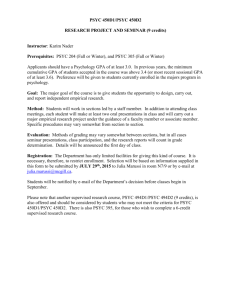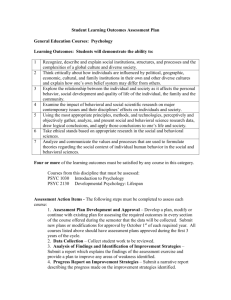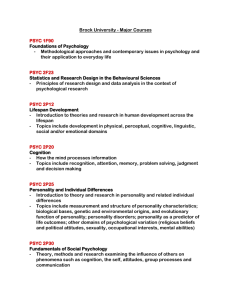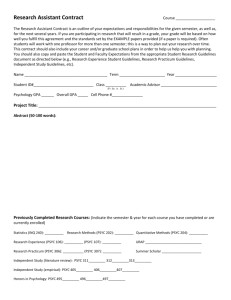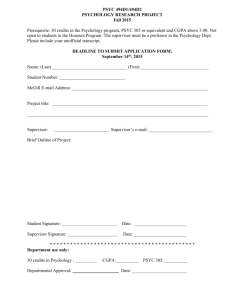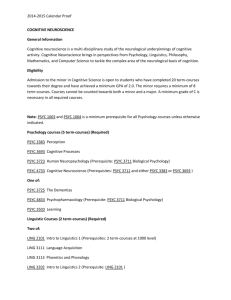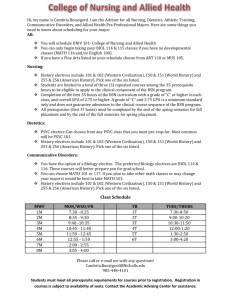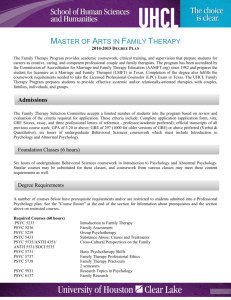Required Coursework - Millersville University of Pennsylvania
advertisement
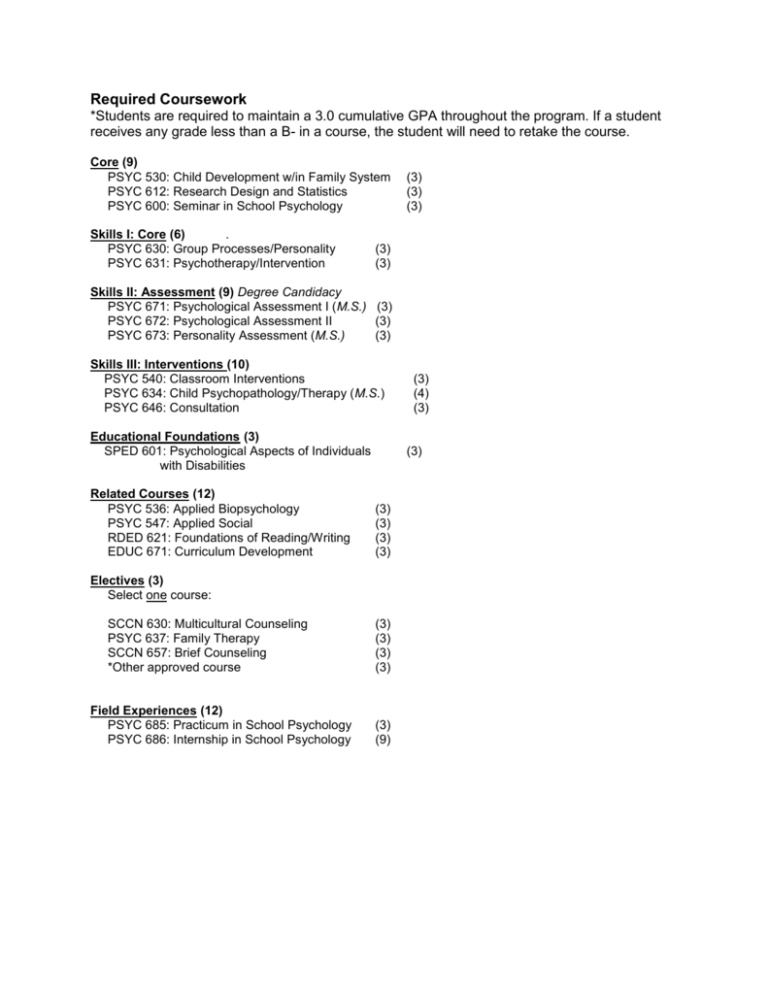
Required Coursework *Students are required to maintain a 3.0 cumulative GPA throughout the program. If a student receives any grade less than a B- in a course, the student will need to retake the course. Core (9) PSYC 530: Child Development w/in Family System PSYC 612: Research Design and Statistics PSYC 600: Seminar in School Psychology Skills I: Core (6) . PSYC 630: Group Processes/Personality PSYC 631: Psychotherapy/Intervention (3) (3) (3) (3) (3) Skills II: Assessment (9) Degree Candidacy PSYC 671: Psychological Assessment I (M.S.) (3) PSYC 672: Psychological Assessment II (3) PSYC 673: Personality Assessment (M.S.) (3) Skills III: Interventions (10) PSYC 540: Classroom Interventions PSYC 634: Child Psychopathology/Therapy (M.S.) PSYC 646: Consultation Educational Foundations (3) SPED 601: Psychological Aspects of Individuals with Disabilities Related Courses (12) PSYC 536: Applied Biopsychology PSYC 547: Applied Social RDED 621: Foundations of Reading/Writing EDUC 671: Curriculum Development (3) (3) (3) (3) (3) Electives (3) Select one course: SCCN 630: Multicultural Counseling PSYC 637: Family Therapy SCCN 657: Brief Counseling *Other approved course Field Experiences (12) PSYC 685: Practicum in School Psychology PSYC 686: Internship in School Psychology (3) (4) (3) (3) (3) (3) (3) (3) (9) Course Descriptions PSYC 530: Child Development w/in Fam. System Theory and research on the development of cognitive, emotional, linguistic, psychosexual, and moral systems in the child. Emphasis on the impact of family structure and dynamics on the developing child. PSYC 612: Research Design and Statistics This course is designed to develop and extend skills in the interpretation of psychological research. Understanding the relationships between research methods, statistical procedures, and interpretation is emphasized. Prereq: undergraduate course in statistics. Offered in fall and spring. PSYC 600: Seminar in School Psychology The philosophy, administrative arrangements, responsibilities and general functions of a school psychologist. Emphasis on research information relating to skills and techniques used by psychologists in the prevention and remediation process as they apply to school children. First-hand experience in the functions of a school psychologist through field visitations and planned seminars. Schedule near the beginning of the program. Offered annually. PSYC 630: Group Processes/Personality Taught as a group process class with the goal of increasing self-awareness, and promoting professional growth. Integrating theoretical concepts of personality with interpersonal experiences and feedback from fellow class participants to enable understanding of his/her personality functioning as it relates to his/her potential to effectively provide mental health services. Offered in fall and spring. PSYC 631: Psychotherapy/Intervention Intensive supervised training in effective helping skills including listening and responding skills, relationship enhancement, interview skills and active interventions. Students receive supervision of videotaped counseling with clients. PSYC 671: Psychological Assessment I (M.S.) Introductory course in individual psychological evaluation, stressing practical experience in administering and interpreting individual psychological test batteries. Standardized intelligence tests are emphasized. Introduces special-purpose tests such as adaptive behavior assessment and brief achievement tests. Students administer tests and write reports under supervision. Prereq: must pass CCE. Offered in fall and spring. PSYC 672: Psychological Assessment II Advanced psychological assessment, stressing practical experience in selecting, administering and interpreting individual psychological test batteries to assist in educational decision making in the schools. Emphasis on ecological and curriculum based assessment. Critical evaluation of instruments and competence in interpreting and integrating results are emphasized. Students administer tests and write reports under supervision. Prereq: PSYC 671. Offered annually. PSYC 673: Personality Assessment (M.S.) An introduction to the administration, scoring, interpretation and application of personality assessment instruments. Introduces objective tests, projective tests and behavioral assessment. Prereq: must pass CCE. PSYC 540: Classroom Interventions Gives service providers skills to identify classroom discipline problems and improve classroom behavior and learning. Students apply behavioral analysis to develop and monitor interventions. Emphasis on selection and evaluation of research-based strategies and school-wide factors which affect student discipline. Offered in fall. PSYC 634: Child Psychopathology/Therapy (M.S.) Introduces students to child and adolescent psychopathology and therapeutic interventions used with children and adolescents. Play therapy techniques with clinical child populations, process groups with adolescents and pre-adolescents, behavioral group therapy, adjunct parent counseling, and cognitive-behavioral procedures are emphasized. Offered in summer. PSYC 646: Consultation Explores the theoretically and practically applied aspects of consultation. Educational, clinical, mental health, behavioral and organizational models of consultation will be covered. Students will develop and implement individual consultation projects. Offered in fall and spring. SPED 600: Orientation to Special Education Introductory overview of special education, primarily for individuals with no previous knowledge of the field. Emphasis is placed upon comprehension of definitions, terminology and classification systems. A general historic background for the areas of brain injured, mentally retarded, emotionally disturbed, socially maladjusted, physical and learning disabilities are reviewed in terms of program development, laws and curriculum. SPED 601: Psychological Aspects of Individuals with Disabilities A survey course of physical, psychological and social aspects of individuals with disabilities. Special attention is paid to disability as a socially constructed experience for people with disabilities as it pertains to learning processes, educational systems and social roles. The historical development of education and human service programs for individuals with disabilities is given consideration. Current terminologies and trends are emphasized. Multicultural aspects are included as they pertain to special education. PSYC 536: Applied Biopsychology Survey of current topics. Includes psychotrophic drugs, neuropsychological assessment and treatment. Emphasis on clinical applications and knowledge base to enable referrals/coordination with related psychiatry/neurology professionals. Prereq: undergraduate or graduate course in physiological psychology or biology or permission of instructor. Offered annually. PSYC 547: Applied Social Examines the effects of social psychological factors on various clinical issues, including racialethnic and cultural issues, the development and maintenance of maladaptive behaviors, clinical judgment, relationship between clinician/school psychologist and client, and the outcome of intervention. Prereq: admission to graduate program or permission of instructor. Offered in fall. RDED 621: Foundations of Reading/Writing Emergent literacy, vocabulary development, comprehension instruction, assessment techniques, and the reading/writing needs of both the exceptional and the culturally diverse learner are explored. EDUC 671: Curriculum Development Developing curriculum in theory and practice for subject areas. Emphasis is on critiquing planned programs of study and articulating a personal philosophy of curriculum design. Offered annually. SCCN 630: Multicultural Counseling The problem of counseling for a culturally diverse population is examined within a broad conceptual framework of issues and concepts. Methods and implications for counseling clients of various global backgrounds are studied. Prereq: SCCN 621. Offered in fall and summer. PSYC 637: Family Therapy Differentiates family therapy from other forms of therapy, aids human services workers in determining the appropriateness or inappropriateness of these tenets for specific types of cases. Supervision in family therapy is provided for six credits. Prereq: must pass CCE. Offered annually. SCCN 657: Brief Counseling This is a third-level skills course which includes brief solution-focused theory, applied to ongoing counseling work with a child client and supervised using videotaped sessions. Strategy selection and implementation are emphasized. Conceptualization,general principles and applications in crisis counseling are included. Prereq: SCCN 651 and passing CCE. Offered in fall. PSYC 685: Practicum in School Psychology Sequential, supervised experiences in field settings working with children of pre-school and school age. Students complete a comprehensive case study. Students meet regularly with University supervisor both individually and in seminars. Prereq: permission of instructor. Offered annually. PSYC 686: Internship in School Psychology Year-long, extensive supervised clinical and field experiences in all domains of school psychology. Students meet regularly with University supervisor both individually and in seminars. Schedule in last year of program. Prereq: PSYC 685 and permission of instructor. Offered annually.
